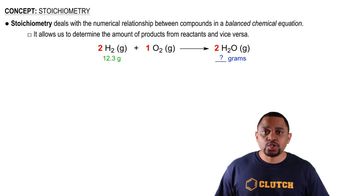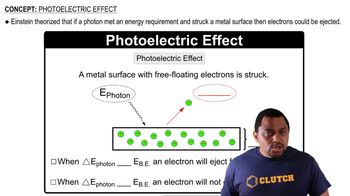Methanol (CH3OH) can be made by the reaction of CO with H2: CO(𝑔) + 2 H2(𝑔) ⇌ CH3OH(𝑔) (b) To maximize the equilibrium yield of methanol, would you use a high or low temperature?
Ch.15 - Chemical Equilibrium
Chapter 15, Problem 68
The water–gas shift reaction CO1g2 + H2O1g2Δ CO21g2 + H21g2 is used industrially to produce hydrogen. The reaction enthalpy is H = -41 kJ. (b) Could you increase the equilibrium yield of hydrogen by controlling the pressure of this reaction? If so would high or low pressure favor formation of H2(g)?
 Verified step by step guidance
Verified step by step guidance1
Identify the change in the number of moles of gas in the reaction. The reaction is CO(g) + H2O(g) → CO2(g) + H2(g). On the left side, there are 2 moles of gas, and on the right side, there are also 2 moles of gas.
Recall Le Chatelier's Principle, which states that if a system at equilibrium is subjected to a change in concentration, temperature, volume, or pressure, then the system will adjust itself to counteract the effect of the applied change and a new equilibrium is established.
Analyze the effect of pressure on the reaction. Since the number of moles of gases on both sides of the reaction is equal, changes in pressure will not shift the equilibrium significantly.
Consider other factors that might influence the reaction, such as temperature. The reaction enthalpy (ΔH) is -41 kJ, indicating that the reaction is exothermic (releases heat).
Conclude that controlling the temperature rather than the pressure would be more effective in increasing the yield of hydrogen. Lowering the temperature would favor the formation of products in this exothermic reaction.

Verified Solution
Video duration:
3mWas this helpful?
Key Concepts
Here are the essential concepts you must grasp in order to answer the question correctly.
Le Chatelier's Principle
Le Chatelier's Principle states that if a dynamic equilibrium is disturbed by changing the conditions, the position of equilibrium shifts to counteract the change. In the context of the water-gas shift reaction, altering pressure can influence the equilibrium position, favoring the side of the reaction that produces fewer moles of gas.
Recommended video:
Guided course

Le Chatelier's Principle
Reaction Stoichiometry
The stoichiometry of a chemical reaction refers to the ratio of reactants and products involved. In the water-gas shift reaction, there are three moles of gas on the reactant side (1 CO + 1 H2O) and two moles on the product side (1 CO2 + 1 H2). This difference in the number of gas moles is crucial for understanding how pressure changes affect the equilibrium yield of hydrogen.
Recommended video:
Guided course

Stoichiometry Concept
Effect of Pressure on Gas Equilibria
In gas-phase reactions, increasing the pressure shifts the equilibrium toward the side with fewer gas molecules. Since the water-gas shift reaction produces fewer moles of gas (2 moles of products vs. 3 moles of reactants), increasing the pressure would favor the formation of hydrogen (H2) and carbon dioxide (CO2), thus increasing the equilibrium yield of hydrogen.
Recommended video:
Guided course

Photoelectric Effect
Related Practice
Textbook Question
582
views
Textbook Question
Methanol (CH3OH) can be made by the reaction of CO with H2: CO(𝑔) + 2 H2(𝑔) ⇌ CH3OH(𝑔) (c) To maximize the equilibrium yield of methanol, would you use a high or low pressure?
435
views
Textbook Question
Ozone, O3, decomposes to molecular oxygen in the stratosphere according to the reaction 2 O31g2¡3 O21g2. Would an increase in pressure favor the formation of ozone or of oxygen?
806
views
Textbook Question
(a) Is the dissociation of fluorine molecules into atomic fluorine, F2(𝑔) ⇌ 2 F(𝑔), an exothermic or endothermic process?
711
views
Textbook Question
(b) If the temperature is raised by 100 K, does the equilibrium constant for this reaction increase or decrease?
626
views
Open Question
Both the forward reaction and the reverse reaction in the following equilibrium are believed to be elementary steps: CO(g) + Cl2(g) Δ COCl(g) + Cl(g). At 25 _x001F_C, the rate constants for the forward and reverse reactions are 1.4 * 10^-28 M^-1 s^-1 and 9.3 * 10^10 M^-1 s^-1, respectively. (a) What is the value for the equilibrium constant at 25 _x001F_C? (b) Are reactants or products more plentiful at equilibrium?
